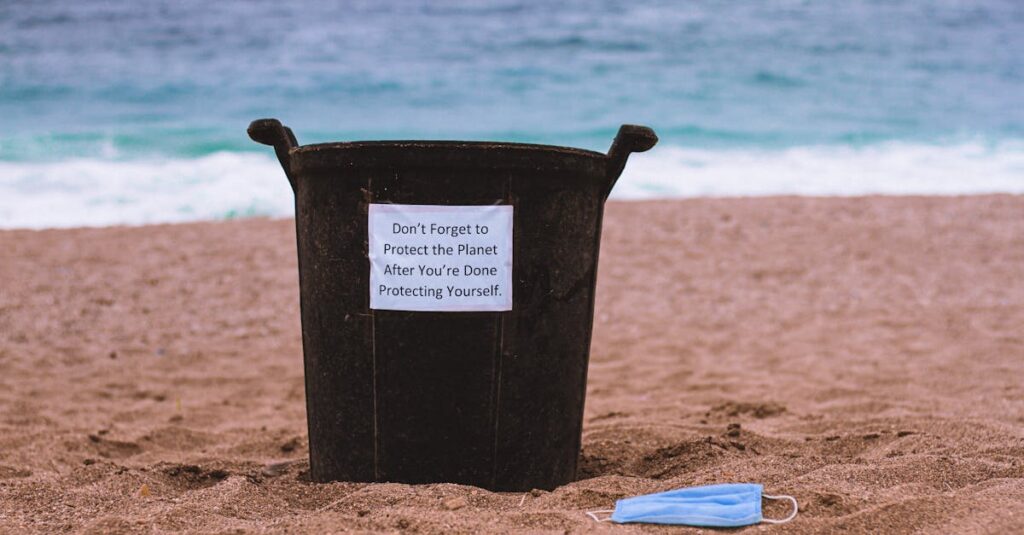Table of Contents
ToggleIn a world that’s more connected than ever, ethical dilemmas are popping up like weeds in a garden. From climate change to corporate greed, global ethical issues challenge our morals and test our resolve. It’s like a game of ethical whack-a-mole: just when you think you’ve tackled one, another pops up to keep you on your toes.
But don’t worry, navigating these murky waters doesn’t require a superhero cape or a PhD in ethics. By exploring real-world examples, we can uncover the complexities of these challenges and maybe even crack a smile while doing it. After all, who said discussing serious topics couldn’t be a little fun? Buckle up as we dive into the fascinating world of global ethical issues, where every example tells a story worth sharing.
Overview of Global Ethical Issues
Global ethical issues encompass a spectrum of challenges that affect societies and the environment. Climate change represents a prominent concern, highlighting the urgency for sustainable practices worldwide. Corporate greed often aggravates these dilemmas by prioritizing profit over ethical responsibilities, leading to exploitation of resources. Human rights violations also frequently emerge, revealing injustices in various regions, including labor abuses and discrimination.
Animal welfare stands as another critical ethical issue, raising questions about how society treats sentient beings in food production, entertainment, and scientific research. Environmental degradation continues to threaten biodiversity, with deforestation and pollution further exacerbating the planet’s health. Additionally, data privacy and security shape ethical conversations in the digital age, as individuals’ personal information faces increasing risks from mismanagement.
Health inequality poses significant challenges, particularly in low-income communities where access to essential services remains limited. Global trade practices often lack fairness, impacting workers in developing countries who may not receive fair compensation for their labor. Each of these issues carries weight, demanding awareness and action from individuals, organizations, and governments alike.
By examining these examples, stakeholders can grasp the interconnected nature of global ethical challenges. Understanding the nuances of these dilemmas fosters informed discussions and encourages collective efforts to address them. Through awareness and engagement, it’s possible to contribute to a more equitable and sustainable world.
Key Global Ethical Issues Examples
Global ethical issues significantly impact societies and the environment. Understanding these challenges fosters informed discussions and collective action.
Human Rights Violations
Human rights violations encompass a range of abuses, including discrimination, torture, and unlawful detentions. Millions face persecution for their beliefs, ethnicity, or sexual orientation. Countries like Myanmar and China have garnered attention for severe violations. Organizations such as Amnesty International continuously report these breaches and advocate for justice. Ensuring universal human rights requires global collaboration and awareness. Public pressure often plays a crucial role in promoting accountability.
Environmental Concerns
Environmental concerns highlight the urgent need for sustainable practices. Climate change significantly accelerates threats to biodiversity and ecosystems. Reports from the Intergovernmental Panel on Climate Change (IPCC) indicate rising temperatures and extreme weather events. Deforestation also contributes to habitat loss, affecting numerous species. Combatting these issues demands collective efforts, including government policies and individual actions. Sustainable practices, including renewable energy and responsible consumption, can mitigate these environmental challenges.
Labor Practices
Labor practices remain a significant global ethical concern. Exploitative working conditions and child labor persist in various industries. Reports by the International Labour Organization (ILO) indicate that millions endure unsafe environments and unfair wages. Companies often face scrutiny for their supply chain practices, emphasizing the importance of corporate responsibility. Fair labor standards promote worker rights and ethical sourcing. Advocacy from consumers can drive businesses towards ethical labor practices, fostering a more equitable global economy.
Case Studies of Global Ethical Issues
Exploring specific examples reveals the complex nature of global ethical issues. These cases demonstrate the impact of ethical dilemmas on societies and the necessity for comprehensive action.
Example 1: Ethical Dilemmas in Technology
Technology poses substantial ethical challenges. Data privacy violations arise frequently, affecting individual rights across the globe. Companies like Facebook have faced scrutiny for mishandling user data, igniting concerns about consent and security. Additionally, artificial intelligence technologies often raise questions about bias and accountability. Algorithms can perpetuate inequalities, particularly when biased training data are used. These issues urge developers and policymakers to prioritize ethical considerations while advancing technological innovation.
Example 2: Issues in Global Trade
Global trade presents various ethical concerns, particularly regarding labor practices. Exploitative conditions in factories are commonplace in industries such as fashion and electronics. Reports indicate that forced labor persists in countries like Bangladesh and China. Moreover, unequal trade agreements can harm developing nations, restricting their economic growth. These factors highlight the need for fair trade practices and corporate responsibility, ensuring that ethical standards are maintained throughout the supply chain. Business leaders must prioritize transparency and fair treatment for workers to foster ethical trading environments.
Addressing Global Ethical Issues
Addressing global ethical issues requires concerted efforts from individuals, organizations, and governments. Awareness plays a crucial role in combatting challenges like climate change and human rights violations. Consider the role of companies in promoting sustainable practices. Sustainable initiatives can mitigate environmental degradation, fostering healthier ecosystems.
Governments need to implement and enforce regulations that protect human rights. Countries like Myanmar and China exemplify severe abuses, making this a priority for international scrutiny. Collaboration can strengthen responses to these violations. Organizations, alongside non-profits and advocacy groups, often lead in raising awareness and applying public pressure on violators.
Corporate responsibility remains imperative across all industries. Ethical dilemmas in technology, especially concerning data privacy and AI biases, underline the necessity for ethical guidelines in development. Development teams should involve diverse perspectives to minimize bias and enhance fairness.
Furthermore, ethical concerns in global trade highlight labor practices. The fashion and electronics industries frequently face scrutiny for exploitative conditions and forced labor. Consumers can influence change by supporting fair trade practices, ensuring that ethical standards are upheld throughout the supply chain.
Transparency is essential to achieving these goals. Ensuring accountability at every level can foster informed discussions and collective commitment. Ethical commitments should not only focus on immediate concerns but also prioritize long-term sustainability and equity. Engaging in these conversations contributes to a more just and sustainable world, benefiting both people and the planet.
Addressing global ethical issues is essential for fostering a just and sustainable future. Each challenge from climate change to human rights violations requires collective awareness and action. Individuals organizations and governments must collaborate to create solutions that prioritize ethical practices and accountability.
By staying informed and engaged with these pressing issues people can contribute to a more equitable world. The journey toward ethical responsibility is ongoing but every effort counts in making a significant impact. Embracing transparency and advocating for change can lead to a brighter future for both society and the environment.





